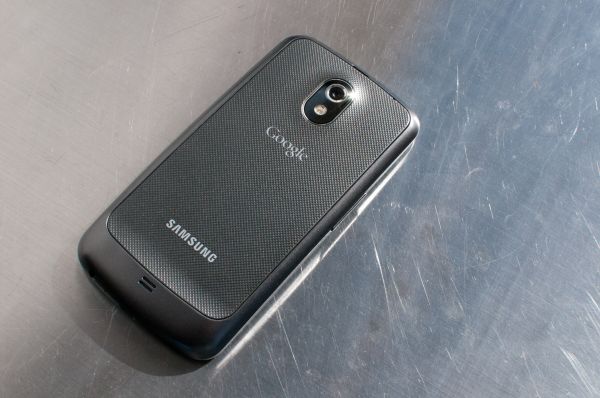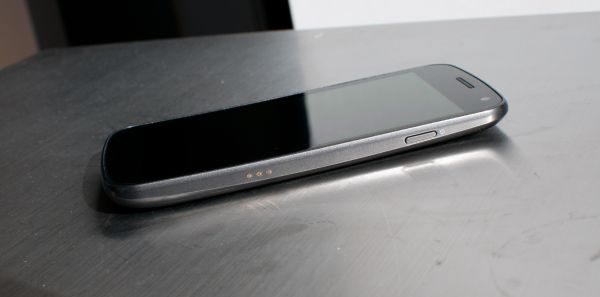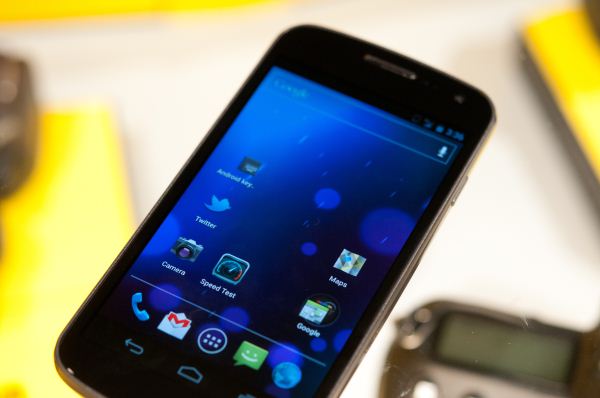Samsung Galaxy Nexus & Ice Cream Sandwich Review
by Brian Klug & Anand Lal Shimpi on January 18, 2012 1:34 PM ESTFor Google, one of the major points of Nexus has always been to provide a stable piece of reference hardware for it to cater a major OS release to. Each device has married a major revision of the Android platform to the latest stable hardware. That isn't to say that the hardware choices are always bleeding edge, but rather modern and logical next steps for the platform. I often read that Android as a platform is plagued by rapid hardware releases and product cycles that leave endless variants of the same hardware for each carrier, and that preloads and skins fragment the experience. While there's some truth to this, it isn't necessarily Google's fault - the software is open source after all. In the case of Android 4.0, this release is about consolidating the tablet and smartphone form factors under one version of Android and negating some talk of the platform's fragmentation.
For Google, each Nexus launch is analogous to Apple's iPhone launch - it's the one time that Google gets to dictate exactly what hardware is coming out, and exactly what software makes it onto that hardware. It is no less significant for Google's platform, either. Thus far there's been one Nexus device released per year, and that hardware gets updates from Google directly - at least until the hardware precludes support.
While the Verizon CDMA/LTE Galaxy Nexus is a bit unique, there's no indication thus far about how long carrier approval will take. The Galaxy Nexus line itself is very interesting - on one side, we have the GSM/UMTS device with pentaband WCDMA support that finally fully detaches the hardware from needing carrier specific versions for each region or carrier on GSM/UMTS networks. This is a dramatic step toward reducing carrier power, turning the networks into dumb pipes, and changing the way US customers shop for devices - exactly what the point was when Google launched the Nexus One. On the other, we have the Verizon CDMA/LTE version which thus far marks the furthest carrier incursion into otherwise untouched Nexus-land.
At this point, the Galaxy Nexus is awesome because of its marriage of Android 4.0 and a number of unique hardware features. I'd go so far to say that the Galaxy Nexus is without question the current best Android device, and with the improvements made in Android 4.0, first party applications and browser are now nearly as smooth as their counterparts in iOS. If OS smoothness was the thing holding you back from Android, 4.0 does a lot to change that. The Galaxy Nexus display is excellent, pentaband WCDMA on the GSM/UMTS model is exclusive only to that device, battery life isn't half bad, instant capture works well, and it has Samsung's newest LTE modem. The downsides are pretty much obvious - the camera is far from awesome, the GSM/UMTS variant has a quiet speakerphone, Samsung is using OMAP4460 at 80% of its maximum clocks, and some Galaxy Nexus displays have more more inhomogeneities than others. There's also the matter of newer 32 and 28nm SoCs that are just over the horizon.
The Galaxy Nexus is so important again because it's the only time Google gets to dictate everything - the hardware, the software, and update timing. There's also the element of freedom, with unlockable hardware out of the box. I find myself wishing that Google had begun its adventure sticking it to the carriers with pentaband WCDMA support like this phone finally has, as that would've been much more successful than the practice of releasing a few different Nexus variants with different bands.
As far as Ice Cream Sandwich is concerned, it really is Android perfected. Everything is smoother, faster and nearly all of our issues with the OS have been addressed. ICS brings Android into 2012 and gives Google a great platform to begin to introduce new features going forward. Android is now very close to UI performance parity with iOS, which eliminates a major tradeoff you had to make in the past. If you were hoping for ICS to be iOS with a Google logo on it, you'll be sorely disappointed. However if you're a fan of Android and just wished it were smoother and more polished, Ice Cream Sandwich is what you've been waiting for.













185 Comments
View All Comments
CoryS - Thursday, January 19, 2012 - link
Guys, this is a NEXUS it is a dev device. That primary reason I got it was because of this...better hardware will be right around the corner...but we won't see another Nexus..especially on Verizon for some time.It is refreshing to have a community to fix issues OEMS ignore (yes even Apple) for a change. This is my first unlocked device, and i can't see myself ever going back to anything else.
medi01 - Friday, January 20, 2012 - link
Wake up, Smartphone market (worldwide):1. Samsung 24%
2. Apple 18%
Android vs Apple = 3 vs 1 and gap is raising.
Most people turn to apple due to FUD, like this article. Google "steppit out of the shade of its competitor" having three times Apple's market share and much more usable interface (try to quickly access settings like wlan/bluetooth/gps on ios)
steven75 - Friday, February 10, 2012 - link
LOL dont you get it? You don't *need* to fiddle with those settings on iOS necause the battery life is so dramatically better.Also, funny reading this comment after Apple's Q4 report where they dominated.
Omid.M - Wednesday, January 18, 2012 - link
I hope Samsung puts out this phone based on GN aesthetics but Exynos 5250 (plus MDM9xxx multi-mode/LTE modem) and blows away the competition.@moids
Chumster - Wednesday, January 18, 2012 - link
Could someone clarify on what GPU/CPU he was talking about coming in Q2 devices? Cray? Crate? It was hard to pick up on my headphones.mmp121 - Wednesday, January 18, 2012 - link
KraitRead below:
http://www.anandtech.com/show/4170/qualcomms-annou...
Enjoy!
Conficio - Wednesday, January 18, 2012 - link
Really, Google can't survive once Walled Garden platforms like iOS gain traction.While it is nice to control the OS (Chrome OS) on PC like devices and nice to stick it to Microsoft, it is essential in the world of smart phones. Google clearly saw that Apple did the unthinkable, wrestle control of the phone's apps away from the networks. That is an existential thread for Google. If there is a billion PC users world wide, there is a multitude of smart phone users, sooner or later.
If a hardware manufacturer and OS provider like Apple (or Microsoft) controls the apps that can be provided to the phone and features, move from browser to apps on phones, then this is the end of (a profitable) google sooner or later.
From anther point of view, Google is a huge data center that provides you with data services on their computing power (and you pay for it with advertisement somehow). Apple is a hardware manufacturer that sees it necessary to control the software to deliver a good user experience. Sure, two different approaches to a smart phone OS.
hackbod - Tuesday, January 24, 2012 - link
"Google clearly saw that Apple did the unthinkable, wrestle control of the phone's apps away from the networks."There is this weird thing I see expressed a lot, as if Android is a reaction to the iPhone.
It is not.
In this particular case, it is obvious: Android's SDK was made available a few months after the original iPhone was on sale, well before there was *any* native SDK for the iPhone. At that time Apple's very clear official policy was that web-based apps was the One True Way to create applications for their phone. There was no concept of an App Store, no phone apps except what Apple shipped built in to the iPhone, nothing wrestled away from the networks in that department.
If Android was a reaction to anything, it was to the current situation on desktop PCs, with one company controlling that platform, and being able to quite strongly dictate and control its ecosystem and thus large parts of the computer industry.
One of the goals of Android was to try to keep that from happening in the upcoming mobile industry, by creating an open platform so that everybody in the industry can compete as equally as possible.
(And an aside -- this also makes it funny to see the recent stuff going around about Google "losing control" of Android. Android was very much set up so that no one company, not even Google, could have anything like the control that Microsoft does over Windows. This should be pretty obvious to anyone who wants to actually write thoughtful articles on the topic and not just link bait.)
bjacobson - Wednesday, January 18, 2012 - link
Can you talk more about this? From Diane Hackborne's post here (https://plus.google.com/u/0/105051985738280261832/... it sounds like the "limitation" is memory bandwidth in that hardwares that are "laggy" are laggy because they can't render to the entire screen 2 and 3x per frame for all the overlays. Which wouldn't seem like so much of a Tegra2 limitation in my opinion considering it has the power to play games like Quake 3 at 1600x1200 @ 60fps (I think...right?). What are your thoughts?hackbod - Tuesday, January 24, 2012 - link
I don't know about the performance of Tegra 2 playing Quake, but you need to be very careful when comparing the traditional 3d workload that GPUs are highly optimized to support (as exemplified by Quake) vs. the performance rendering 2d graphics.Traditional 3d games tend to rely, for example, on triangle rendering as much if not more than raw pixel fill rate, and GPUs are designed to be able to do that fast. When drawing 2d scenes, there are very few triangles but those triangles cover very large parts of the screen and are rendered as overlapping layers.
On all of the hardware I have seen, for 2d rendering raw memory bandwidth (determining the number of times every pixel can be touched per frame) is the #1 impact on performance.
Look back at that post -- for a typical scroll of all apps in launcher, without using overlay tricks (which aren't available on Tegra when the screen is rotated), you are looking at touching every pixels about 4 times to render all the layers and composite them to the screen. This is just not a typical 3D game workload.